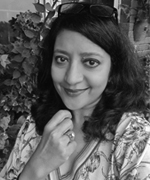The practice is more important than the text
 Ghazala Wahab
Ghazala Wahab
Khadija, a software engineer from Hyderabad, went to the US after marriage nearly 10 years ago. Her husband, also a software engineer, was already a US citizen. Two years after their marriage, they had a son. As her new job required travelling, the couple had to depend on frequently changing au pairs to look after the child. Sure enough, baby Omar had little clue about India, much less the religion of his parents. By the time, he was five, Khadija and her husband started having guilt pangs because he was growing up too much like an ‘American child’. He was removed not only from his Indian realities but also his religion. Since the parents didn’t have much time to do anything about this, they did what they thought was best under the circumstances. They enrolled him in a madrassa, affiliated with the local mosque run by Egyptians, for weekend classes. It was a compromise, but what the heck. Even if he didn’t learn about the Indian values, at least he would learn to read the Quran.
Every Saturday morning Khadija would drive little Omar to his madrassa and her husband would pick him up in the evening, till one day last year, when Khadija got a call from the headmistress of the day school Omar attended during the week. She was both distressed and concerned. During a fisticuff with a classmate, Omar said a few anti-US and anti-Christian things, which was something a suicide bomber would probably have said before blowing himself up. Now where could Omar have learnt these things, if not at home? And if his parents were saying these things at home then what were they doing in the US. Ideally, they should be in Guantanamo, or at least deported back to the country of their origin. Because the headmistress was so concerned, Khadija was not the only person she called. Being a vigilant citizen, she also informed the local police so they could do some ‘checking up’ on the family. Needless to say, the family was horrified, not to say scared as hell. Omar was pulled out of the madrassa and after many sessions with the school authorities as well as the police, it was finally decided that it would be best if the parents could undergo some social counselling for a few weeks just to understand the American values better. “So many times during those weeks, we felt like packing our stuff and returning to India,” says Khadija. The nightmare lasted a few months because even after the counselling was over, the police continued to keep an eye on the family, dropping in once in a while for a chat.
But why did Khadija, who is not a devout practitioner of Islam, even think of sending her child to a madrassa? Hardly any Muslim family (except the very poor who look upon madrassas as the only source of education they can give their children) send their children to madrassas. Religion is largely taught at home, if not by a family member then by private tutors. The less financially endowed people send their sons to the local mosque in the evening where they learn the Quran by the rote. Khadija says, “I grew up in a liberal household and learnt my basic lessons on Islam at home,” she says. “Though I said the namaz once in a while, over the years I had nearly forgotten how to read the Quran in Arabic. In the US, neither of us had the time or the skills to teach Omar about Islam, so we felt it would be better if he learnt the basic scriptures professionally.”
Though neither Khadija nor her husband are conservative Muslims, yet they felt that their only child needed to know his religion in the proper way. And they also felt that they were not competent to tell him what his values should be. This problem does not afflict the Muslims alone. More people are becoming intolerant and rigid when it comes to their religion. They want to follow the text of the religious books without understanding its spirit. Hence, their religion is becoming a check-list of do’s and don’ts. In the bargain, they forget that a religion is not only what the books say, but also what is believed and practiced by the majority, because religious practices evolve over the years, responding to changing social conditions. Terrorism in the name of Islam in some measure is one such manifestation of this growing intolerance.
Following the London bombing of July 2005, the British government has created a cell to understand the psyche of a terrorist. “We are trying to study how a radical becomes a terrorist. And how long it takes a terrorist to become a suicide bomber,” said one official during a recent trip to India. The starting point of the study should actually be how an average person gets radicalised to begin with. Radicalism is a slow and often a reversible process, involving several false steps. From a radical to a terrorist is a small step, which most people never take. But some do. Many people in India also are getting radicalised. So far, the process is stopping there. Yet, radicalism is dangerous and the worrisome thing is that often a small trigger can lead to violence.

